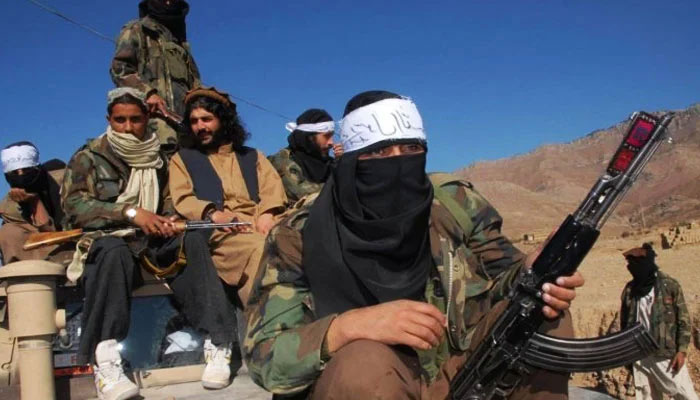TTP and the Taliban
TTP’s operations, thanks to significant backing from Afghan Taliban, are expanding across border
The ongoing support provided by the Afghan Taliban to the Tehreek-e-Taliban Pakistan (TTP) is hardly something only Pakistan has noticed. According to a recent report submitted to the UN Security Council by the Analytical Support and Sanctions Monitoring Team, this alliance is contributing to an alarming rise in terrorism, particularly in Khyber Pakhtunkhwa and Balochistan. The TTP’s operations, thanks to the significant backing from the Afghan Taliban, are expanding across the border. Cross-border assaults have increased; in fact, over 600 attacks were recorded in 2024. In addition to logistical and operational support, the Afghan Taliban are reportedly also providing the terrorist group substantial financial aid, including monthly payments of $43,000. This is not unknown to Pakistan but the UN report validates Pakistan’s consistent position that the Afghan Taliban’s relationship with the TTP has evolved from mere tolerance to active cooperation. The TTP has reportedly enhanced its infrastructure in Afghanistan, opening new training centres in several provinces and bolstering recruitment efforts, which now include fighters from the Afghan Taliban itself. This strategic partnership with other militant organisations, such as Al-Qaeda in the Indian Subcontinent (AQIS), is creating a growing regional threat, with the TTP potentially becoming a hub for other militant factions.
And this escalation is not confined to Pakistan alone. The Taliban’s actions are threatening the wider stability of the South Asian region. Just a few days back, Pakistan’s Ambassador to the UN Munir Akram had emphasised that the threat posed by organisations like Daesh, TTP, and the Majeed Brigade is not just confined to Afghanistan and Pakistan but represents a global challenge. He had called for a comprehensive and coordinated strategy to address these terrorist threats, advocating for a reform of the UN’s counterterrorism infrastructure to deal with emerging threats like cyber terrorism, disinformation and the exploitation of new technologies for radicalisation and financing. There is also the issue of increasing synergy between the TTP, AQIS and other militant factions such as the Balochistan Liberation Army (BLA).
Pakistan has repeatedly asked Kabul to stop terrorist groups from using Afghan territory to target Pakistan but Kabul’s evident disregard for these appeals suggests it may be a deliberate part of their strategy. In response, Islamabad has ramped up military operations against these groups, but the situation has continued to deteriorate. In January 2025 alone, terrorist attacks in Pakistan surged by 42 per cent, causing significant casualties among both security forces and civilians. For example, on Saturday, four Pakistani soldiers were martyred, while 15 terrorists were eliminated in two separate operations in Khyber Pakhtunkhwa. The implications of these deadly encounters are not Pakistan’s sole burden. This violence, this terror, goes far beyond the immediate region. As is typical with terror groups, they are never content to stay confined to a single area. Afghanistan must fully grasp the catastrophic impact its support for the TTP is having. Pakistan is already grappling with an insurgency in Balochistan, which, fueled by Indian interests, threatens to destabilise us further. When groups like the BLA and TTP begin to converge, it sets the stage for a disaster that could engulf not just our immediate neighbours but the entire region. This is something no one should be rooting for. Pakistan, Afghanistan, India and the global community really need to reevaluate their current strategies – the stakes are just too high to ignore.
-
 Alicia Keys Celebrates 25 Years Of Breakout Single ‘Fallin’’
Alicia Keys Celebrates 25 Years Of Breakout Single ‘Fallin’’ -
 Akinola Davies Jr. Gives His Immigrant Parents A Shoutout In 2026 BAFTAs Acceptance Speech
Akinola Davies Jr. Gives His Immigrant Parents A Shoutout In 2026 BAFTAs Acceptance Speech -
 Princess Beatrice, Eugenie Told 'first Thing They Should Do' After Andrew Arrest
Princess Beatrice, Eugenie Told 'first Thing They Should Do' After Andrew Arrest -
 Jennifer Garner Reveals What Her Kids Think Of Her Acting Career
Jennifer Garner Reveals What Her Kids Think Of Her Acting Career -
 Prince William Should Focus On 'family Business' After Andrew Blunder
Prince William Should Focus On 'family Business' After Andrew Blunder -
 Katherine Schwarzenegger Pratt 'brought To Tears' By Sister-in-law's Gesture
Katherine Schwarzenegger Pratt 'brought To Tears' By Sister-in-law's Gesture -
 Prince William Makes Bold Claim About Britain's Creative Industry At BAFTA
Prince William Makes Bold Claim About Britain's Creative Industry At BAFTA -
 Andrew Mountbatten Windsor Insulting 'catchphrase' That Degarded Staff
Andrew Mountbatten Windsor Insulting 'catchphrase' That Degarded Staff -
 Kate Middleton, Princess Beatrice 'undercurrent Tension' Comes To Surface
Kate Middleton, Princess Beatrice 'undercurrent Tension' Comes To Surface -
 'Grey's Anatomy' Alum Katherine Heigl Reveals Why She Stayed Silent After Eric Dane Loss
'Grey's Anatomy' Alum Katherine Heigl Reveals Why She Stayed Silent After Eric Dane Loss -
 Host Alan Cumming Thanks BAFTAs Audience For Understanding After Tourette’s Interruption From Activist
Host Alan Cumming Thanks BAFTAs Audience For Understanding After Tourette’s Interruption From Activist -
 Jennifer Garner Reveals Why Reunion With Judy Greer Makes Fans 'lose Their Minds'
Jennifer Garner Reveals Why Reunion With Judy Greer Makes Fans 'lose Their Minds' -
 Chris Hemsworth Makes Shocking Confession About His Kids' Reaction To His Fame
Chris Hemsworth Makes Shocking Confession About His Kids' Reaction To His Fame -
 Wiz Khalifa Reveals Unconventional Birthday Punch Tradition With Teenage Son In New Video
Wiz Khalifa Reveals Unconventional Birthday Punch Tradition With Teenage Son In New Video -
 BAFTAs 2026: Kerry Washington Makes Debut In Custom Prada Gown
BAFTAs 2026: Kerry Washington Makes Debut In Custom Prada Gown -
 Jennifer Lopez Gets Emotional As Twins Max And Emme Turn 18
Jennifer Lopez Gets Emotional As Twins Max And Emme Turn 18




